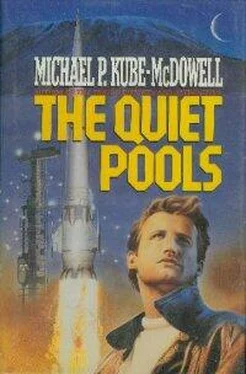Still the capsule climbed, still the capsule slowed. Two kilometers, three, three and a half. Any moment, it seemed, it would begin to fall back. And then the great bank of lasers came to life as one. The ten-gigawatt beam filled the full diameter of the beam tube, caught all twenty mirrors, and leaped across the sky to the broad base of the freighter.
The first pulse vaporized an almost invisibly thin layer from the ice disk, forming a vaporous sheet of pure, clear, superheated steam. A second pulse, a microsecond later and a hundred times stronger, shattered the molecules of water vapor into an atomic cloud of raw hydrogen, oxygen, and electrons, a plasma hotter than any chemical rocket flame, hotter even than the surface of the Sun. The plasma expanded savagely outward, kicking the spacecraft upward, as though it were the piston in a bizarre engine.
A thousand times a second, the lasers cycled through their double pulse. The awesome seamless roar of the closely spaced explosions was moderated only by distance, the pitch changing as the capsule accelerated, Doppler-shifting into the familiar falling, fading scream of a T-ship.
In the launch operations center, what little tension there could be in a routine repeated more than sixty times a day had evaporated when the thrust beam picked up the T-ship. The T-3 was riding the beam now, accelerating toward orbit, safely out of reach. Even the launch security officer, the man in the loop on Kasigau’s air defenses, sat back in his chair and reached for his drink.
The failure of the AI protocols in the Houston incident had led to the LSO being given unprecedented responsibility. Now, the AIPs could kill. The LSO had gone from being the only station that could call down the fire from the mountain to the only one that could stop it. Which meant that the LSO’s errors now would be errors of commission, not omission.
Yusuf Alli had not welcomed his newly elevated status. Kasigau was ringed by airports—the big one at Mombasa, the fields at Voi and Malindi, and fifteen rural airstrips within the primary air control area. The air traffic swarmed like bees around a hive. But every time a red light came up on the board, Alli had thirty seconds to call for a hold, and then one minute to make his decision. If he made a mistake, people would die.
Through the first three weeks under the revised protocol, Alli had dealt with his anxiety in a straightforward way. He always called for a hold, and then always gave the target a green. He had yet to be wrong. He knew there was some risk, but if any air traffic managed to reach the threat envelope of a T-ship on the climb, the defense system would bring it down without getting a second opinion. It was, he thought, foolproof.
Then the contact alarm sounded, and Alli jerked forward in his chair, choking on his tea.
“Hold,” he sputtered. “Hold!”
“Tracking missile,” said the board. “Threat category three. Risk category: moderate. Time to intercept: twenty-one seconds.”
Alli wasted three seconds staring at the track of the streaking missile. “It’s a clean miss,” he protested. “It won’t get within fifty klicks of the can.”
“Risk category: high. Time to intercept: eleven seconds.”
Alli’s eyes danced frantically over the displays. “What’s the danger? What can they hit?”
“Possible beam occlusion. Time to intercept: five seconds.”
At the same time, someone was screaming at him, “Burn it! Burn it! They’re going for the beam!”
Ashen-faced, Alli brought his palm down on the fire mushroom. One of the twenty lasers abandoned the synchrony of the launch rhythm, as atop the castle an auxiliary mirror rotated a few degrees. A defensive beam locked on the hurtling missile, and an instant later the missile exploded.
“Got it!” exulted Alli.
But the alarm kept sounding, and the displays continued to track something—now a cloud of a hundred smaller objects, still climbing as they fanned out. Then each of the smaller objects seemed to explode, and the missile was now a scatter of marble-sized projectiles. Moving nearly as fast as the missile itself had been, the chemical buckshot intersected the beam.
The first pulse heated the binder holding the projectiles together, and they blossomed into a dense cloud of aluminum dust. The next pulse, striking the fine particles, lit a myriad of tiny plasmas that quickly merged into a huge, sun-hot flare, dissipating the beam’s energy as light and heat. Only a tiny fraction of that pulse got through to the T-ship. The echo, used for tracking and guidance, was smothered completely. The next cycle was completely choked off.
At full power, the launch cannon could have burned through the cloud in a matter of seconds. But with no positive track on the target, no reflection back from the T-3, the laser controller declared a scrub and shut the HEL array down.
Three hundred kilometers away, the freighter began to fall, as though the string holding it aloft had been cut. Before long, it reappeared on the radar displays, no longer eclipsed by the dissipating cloud.
“Can we get it back?” the launch boss asked, little hope in his voice.
“She’s tumbling from the drag,” reported one station. “There’s no target.”
“Can we burn it?”
“No. Too much atmospheric absorption, and we’re losing the angle.”
“Jesus Christ,” the launch boss said. “Where’s it coming down? Indian Ocean? God, just drop it in the ocean—”
The answer was slow in coming. “South China Sea.”
Relieved expressions blossomed throughout the room.
Then the tracking officer added, “Maybe landfall in Malaysia. Singapore. I can’t be sure.”
“Damn,” breathed the launch boss.
“Can’t we warn them?” a sweaty and pale Yusuf Alli burst out.
Silently, his mouth tight with anger, the launch boss shook his head. “And tell them what?” he asked. “To put up their umbrellas? It’s coming down hard. There’s no place to hide.”
The freighter was a hurtling meteor of ice and steel, thirty-two tons of inert mass tracing the arc dictated by the forces which had acted on it. Its fall through the afternoon sky went mostly unnoticed across the eastern third of the Indian Ocean, except by a navigational satellite in high orbit, the commercial radars at Colombo and Djakarta, and a Chinese warship in the Gulf of Thailand.
As air friction tore at the tumbling spacecraft, the great disk of reinforced ice shattered, jagged chunks of it spinning away as it passed over the island of Sumatera. One piece smashed into a tree-covered hillside near Siabu, scattering a family of civet cats. Another buried itself dramatically in a rice paddy on the flats near Dumai, scattering a family of farmers.
But the freighter itself remained whole, its dive becoming steeper as it neared the surface. Sumatera slid away beneath, then the islands of the Strait of Malacca and the tip of the Malay Peninsula.
By now the spacecraft was lighting up the radar screens at Paya Lebar Airport in Singapore. Controllers there watched in astonishment as it dove toward the Singapore Strait at more than four thousand klicks per hour.
The pilot of a Boeing 350 which had just taken off from the airport saw it as a fiery streak which bisected the sky less than a kilometer in front of his plane.
A million people heard the thunder from a cloudless sky, the death-rattle shattering windows all across the city. A hailstorm of glittery razor-edged fragments rained down to the streets from the jagged wall of high rises facing the harbor.
Thousands on the Singapore waterfront witnessed with amazement the spectacular fountain and plume of steam that erupted as the T-ship plunged into the waters of the strait.
But then it seemed to be over. There was much pointing, many voices raised in excitement, a few raised in hysteria. Those who had missed the moment rushed to hear the story from those who had witnessed it. The waterfront was a carnival of questions.
Читать дальше

![Nick Cracknell - The Quiet Apocalypse [= Island Zero]](/books/28041/nick-cracknell-the-quiet-apocalypse-island-zero-thumb.webp)










